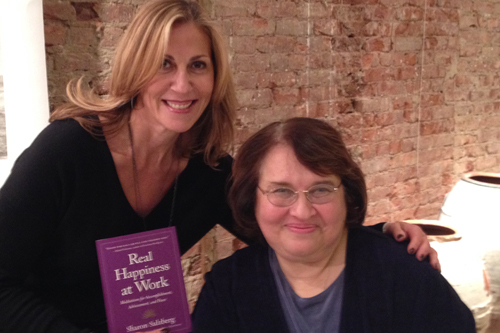
The room was stark white. Huge black-and-white photographs of elephants covered the walls. On tables between the white chairs and big colorful cushions, votive candles flickered, creating an air of tranquility. As I walked in I immediately felt like I was visiting old friends—and to my surprise I was greeted by a dear friend, Barbara Biziou. And then I made a few new ones. As Sharon Salzberg entered the room and took her seat, even her presence felt like om—a deep exhalation. We were all together in this space, and I was at peace.
I’ve been an admirer of Sharon’s for many years. She’s one of America’s leading meditation teachers, a prolific author, and one of the founders of the Insight Meditation Society. But beyond her remarkable resume she’s dynamic and relatable and I always learn something new from her, so I was thrilled that the Garrison Institute was hosting a launch party for her new book, Real Happiness at Work: Meditations for Accomplishment, Achievement, and Peace (Workman), at ABC Carpet & Home.
So many of the things Sharon shared helped me appreciate work as an opportunity for growth and change.
So many of the things Sharon shared helped me appreciate work as an opportunity for growth and change. She told a story about when she was a young woman, newly returned to America after studying in India. Her meditation teacher had told her, “This is what you must do—teach.” So that’s what she did. Petrified of speaking in front of an audience, she eventually came to terms with the truth that it wasn’t about her, that her work had meaning and she just needed to step out of her own way. Once she made this realization she became invested in her teaching. How often do you need to remember to step out of your own way in work situations? I’m sure we all do.
Sharon also spoke about mindfulness practice—Buddhist vipassana meditation—which she’s been teaching since 1971. She described it in a way that I’d never quite heard before: “reclaiming the integrity of our own vision.”
“Madam, the traffic is not your fault.” And after a moment he added, “Nor is it mine.”
How great is that? “Madam, the traffic is not your fault. Nor is it mine.” Understanding those words didn’t just change Sharon’s day or her mood. They also illustrate what she means by the kind of experience that can give an event or action, like our work, meaning. When we’re able to disconnect from the negative influences in our environment (and most of these are in our heads), we’re able to disconnect from the emotion of that discomfort. We can stop getting so caught up in our own thoughts of what we think we know—like what is causing the traffic, whose fault it is, or how we can get out of it—and start seeing what really is.
Sharon also spoke about mindfulness practice—Buddhist vipassana meditation—which she’s been teaching since 1971. She described it in a way that I’d never quite heard before: “reclaiming the integrity of our own vision.” I loved that. She went on to explain how we can become more mindful by not staying stuck in the past, hashing and rehashing things that have already happened. This creates a cycle of fear about things that might never happen and things that have already happened but can’t be changed. It reminded me of Maya Angelou’s powerful words: “History, despite its wrenching pain, cannot be unlived, but if faced with courage, need not be lived again.”
I picked up my copy of Sharon’s book, excited to learn more ways we can take care of ourselves by establishing and replenishing our “culture of wellness.” But for the time being I’d learned a lot and headed home inspired and rewired.

Rose Caiola
Inspired. Rewired.


